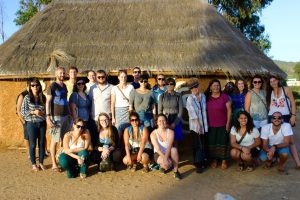J-Term Practica, 2016
Compromise vs. Compromise
April 4, 2016

In any circumstance, there are innumerable means of response. In our travels in Chile and with our experiences with the Mapuche, we were able to observe several reactions to the marginalization and injustice that has been enacted upon these various communities. Despite differing these reactions amongst the groups, all shared a common sentiment of the importance of preserving the Mapuche culture.
One avenue for resistance that has lingered as unique in my mind was the
intercultural school we visited. Upon arriving, the chairs were set up in a typical lecture format, rows all facing the front. After only minutes, our host asked if we could rearrange. The new arrangement was a large circle where all in the room could face each other and converse. We then went around the circle and introduced ourselves so that we could get to know those with whom we were interacting and they could have some, however slight, glimpse of who we were as individuals. This was a familiar practice that we had seen in multiple Mapuche communities; each time they stressed the importance of
dialogue and exchange in the Mapuche culture.
In this context though, the practice felt less of a formality but acted rather as a
starting point for the rest of the visit. After the introductions and some initial
conversation, we were given a tour of the facilities. The school was an intercultural school where Mapuche culture instruction was part of the curriculum. A small group of us lingered in one of the student dormitory halls and spoke candidly with one of the employees and her son. Again, an openness for dialogue, a desire for understanding on both sides was evident. While talking to her, we discovered that the school was government funded. The teachers were also Mapuche and the ones that we interacted with shared the zeal present in other Mapuche communities.
In many other communities, a stated value of communication and conversation was stressed, but here, in multiple capacities, it was demonstrated. And this was not only visible on an individual level, but I would argue that it could be seen in the very mode of resistance. Other forms of resistance observed in our visits exhibited more friction and were more perceivably situated in opposition and conflict with the government. The
school community leaders, though they shared the same discontent with the situation, were combating the problem in an entirely different manner. They were preserving culture within the system and were even getting funding. Dialogue and positive interactions rather than hostility, antagonism, or an unwillingness to even engage the government has helped preserve the Mapuche culture. This response shows adaptability and immediate results, while also staying true to their principles. The school exemplifies the potential to compromise with people while refusing to compromise one’s own values.




You must be logged in to post a comment.